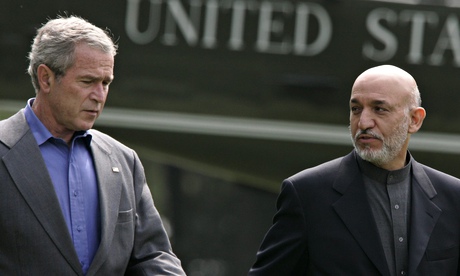“No man who has read a page of Indian history will ever prophesy about the Frontier. We shall doubtless have trouble there again.” So wrote Lord Curzon, then viceroy, in 1904. The British were by then a little weary of the burdens of empire; they were having trouble with the tribespeople of the Frontier, who seemed uninterested in the sort of governance the colonialists wished for them. The smugly racist Curzon blamed it on the “fanaticism and turbulence” that “ferment in the blood” of the Pashtun. The neocolonialists of today cannot explain things away so easily. As Steve Coll documents in Directorate S, the current war has for ever altered the fates of all three countries involved – the US, Afghanistan and Pakistan – and, after 15 years, there is no end to the “trouble” in sight.
Directorate S, from which the book gets its title, lies buried deep in the bureaucracy of the ISI (Inter-Services Intelligence), Pakistan’s spy agency. Ensconced thus, the directorate works to “enlarge Pakistan’s sphere of influence in Afghanistan”. It goes about this task, Coll explains, by supplying, arming, training and generally seeking to legitimise the Taliban, the AK-47 toting terrorists who took over Afghanistan in 1992, stringing up decapitated corpses in town squares and shoving women into the confines of their homes. Nobody paid much attention then, and perhaps never would have, had the Taliban not become host to Osama bin Laden.
Bin Laden, the architect and financier of the 9/11 attacks, was the US’s most obvious target, and in order to get him, sights had to be set on Afghanistan. The scene Coll paints is riveting. In a house on the outskirts of Kandahar, the Taliban leader Mullah Mohammed Omar picks his toes while then-ISI chief Mahmud Ahmed tries to convince him to give up Bin Laden. It doesn’t happen, and neither Ahmed’s entreaties to the Americans (“I implore you not to fire a shot in anger”) nor his warnings (a strike will produce thousands of frustrated young Muslim men) nor his alternatives (reasoning with them will work better to get rid of terrorism) have any effect. The Americans ignore the lessons of history. George W Bush declares that the time for negotiating is over.
It is a tragic moment, not least because we know of the perfidy and pain to come. In the pages of Directorate S, the sequel to Coll’s Pulitzer prize-winning Ghost Wars, the story is delivered with a literary prowess that has been absent in previous western accounts of America’s longest running war. The dance of blame, with the US swaying at one moment towards Pakistan and the next towards Afghanistan, is a choreography familiar to CIA chiefs, US presidents and writers who have tackled the subject. Coll refuses to follow this tired tune, and the result is masterful.
Directorate S takes readers deep into the malevolent intrigues of spycraft with its cast of colourful characters: there is the Dunhill smoking spy chief Ashfaq Kayani; the fitness-obsessed, water-guzzling General David Petraeus; special envoy Richard Holbrooke, who calls his diplomacy “jazz improvisation”; not to mention such Taliban commanders as Omar, who makes off over the Pakistan border on a motorbike. The latter’s escape, Coll astutely notes, was a “lost opportunity”; had he been caught, it could have changed everything. The more notorious missed opportunity is the escape of Bin Laden from the Tora Bora cave complex a few months later. Coll recounts that, too, with fascinating details. For instance, just as General Tommy Franks is setting up a plan to get Bin Laden, a demanding Donald Rumsfeld calls and asks to see within the week war plans for the invasion of Iraq. For the Americans, it seems, Afghanistan was both a constant and an afterthought.
Directorate S provides telling background descriptions with just as much skill. When US soldiers run into an abandoned school for al-Qaida suicide bombers, they find that “the recruits studied in concrete rooms” the walls of which “were painted with murals of the afterlife”, in one “channels of milk and honey” and in another “paintings of virgin girls”. At the CIA, the Counter-Terrorism Center analysts hunt terrorists huddled over “low-grade industrial carpeting, cookie-cutter Government cubicles” in large rooms that are “poorly lit and smell sour”. In an attempt at relief, “someone had mounted fake windows looking out on beaches and palm trees”. Fantasy, it seems, is the fuel of both endeavours.
Then there are the absurdities: the supposedly indelible ink that washed off when Afghans went to vote in their first postwar election; the drone operators who hope dogs jump off the trucks at which they are about to fire missiles; and the mass of blunders that has killed 140,000 people but that US Isaf (International Security Assistance Force) commanders still describe as “a war to give people a chance”. In the 15-year story that Directorate S tells, Afghanistan has been built a bit and bombed a lot, the Taliban have been fought with and then courted, the Pakistanis embraced then abandoned. What the British tried to document in Curzon’s day the Americans refused to learn; there is indeed trouble on the Frontier again, and in Directorate S we have the definitive account of it.
• Directorate S is published by Allen Lane. To order a copy for £21.25 (RRP £25) go to bookshop.theguardian.com or call 0330 333 6846. Free UK p&p over £10, online orders only. Phone orders min p&p of £1.99..










